
AAAP in the Media
Displaying 1 - 12 of 43
African Union welcomes the Netherlands’ contribution of EUR 110 million for the Africa Adaptation Acceleration Program at COP27
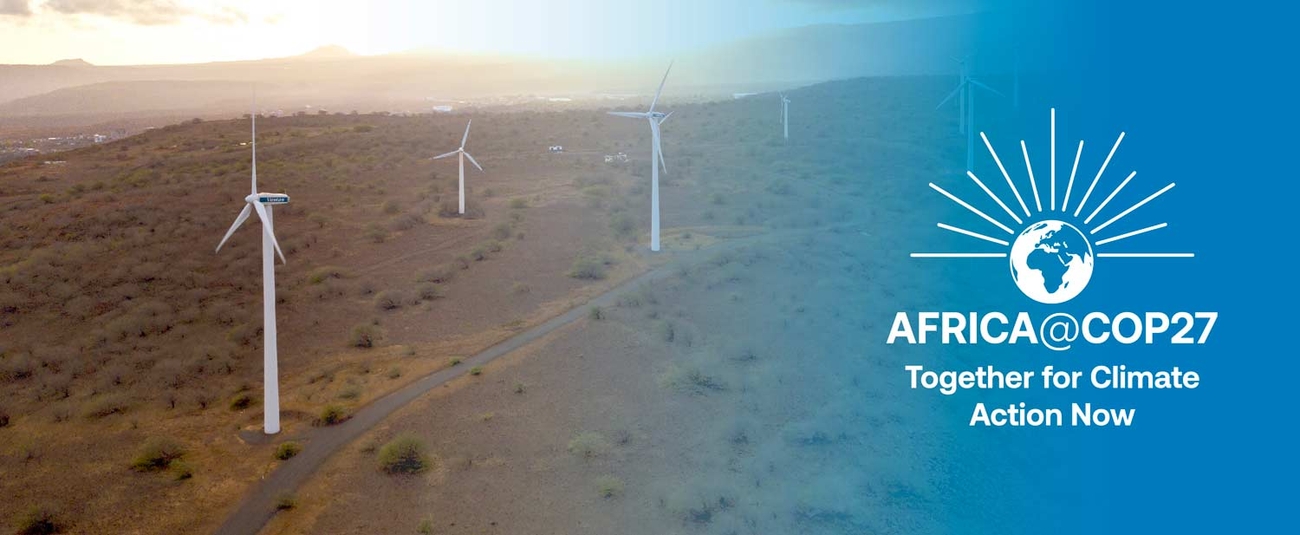
The African Union (AU) welcomed the Netherlands’ contribution of EUR 110 million in support of the Africa Adaptation Acceleration Program (AAAP) ahead of the COP27 Leaders’ Event on Accelerating Adaptation in Africa.
The Prime Minister of Netherlands Mark Rutte announced the financial commitment during a high-level meeting with Senegal’s President Macky Sall who is also the Chairperson of the African Union, Patrick Verkooijen, CEO of the Global Center on Adaptation, and the President of the African Development Bank Group Dr Akinwumi A. Adesina.
President Sall underlined the importance of action over words as world leaders meet this week to discuss the global response to the climate emergency, highlighting that “Africa is ground zero for the global climate breakdown. Nobody benefits if Africa fails to tackle it. The AAAP is Africa’s response to the climate crisis to leverage investments in adaptation and resilience not just to protect ourselves from the threat of climate change, but to drive a green economic growth agenda for prosperity.”
Prime Minister Rutte said “We have to face reality: climate change is already having lasting effects. Climate resilience must be our motto, climate adaptation our common endeavour. Adapting to climate change is in the DNA of the Netherlands and it is vital that we work with our partners in Africa to ensure investments flow through the bold and innovative roadmap that AAAP delivers for climate-proofing cities, farms, and infrastructure, to protect livelihoods and to ensure economic continuity.”
AAAP was developed by African Development Bank and the Global Center on Adaptation (GCA) to mobilize $25 billion by 2025 to implement, scale and accelerate climate adaptation across the African continent. This ambition is delivered through the AAAP Upstream Financing Facility managed by the Global Center on Adaptation and the African Development Bank’s climate action window which is developed in the context of the 16th replenishment of the African Development Fund, the Bank’s concessional arm that supports the continent’s low-income countries.
AAAP works across four bold interconnected pillars to achieve transformational results: Climate-Smart Digital Technologies for Agriculture and Food Security; African Infrastructure Resilience Accelerator; Youth Empowerment for Entrepreneurship and Job Creation in Climate Adaptation and Resilience and Innovative Financial Initiatives for Africa. AAAP has already guided over $3.5 billion of upstream investments in 19 countries with every dollar spent influencing $100 downstream.
Professor Patrick Verkooijen, CEO of Global Center on Adaptation welcomed the financial contribution from the Netherlands, thanking Prime Minister Rutte and President Sall for their leadership on climate adaptation in Africa to mobilize the global community to honor their commitment of doubling global climate finance at COP27: “AAAP’s catalytic interventions have already rapidly delivered impact at scale by mainstreaming adaptation into projects worth over $3.5 billion since 2021. The Netherlands’ support of EUR10 million for the AAAP Upstream Financing Facility will influence investments in adaptation worth a further EUR 1 billion for Africa.”
“This scale of impact is vital as Africa – indeed the world – is confronting multiple global shocks that are reverberating through our economies. AAAP gives impetus to the critical actions and global finance needed to address the climate and food crisis today, and to build a more resilient continent.”
Speaking at the high-level meeting, the President of the African Development Bank Group, Dr Adesina said: “The EUR 100 million financial support from the Netherlands towards the AAAP Climate Action Window of the African Development Fund is a major impetus for our efforts to bolster support for low-income countries of Africa that are most vulnerable to climate change”.
“It is a great start as we accelerate efforts to mobilize more climate adaptation financing for Africa through the AAAP. This is a great outcome right here at COP 27 –the Africa COP -- with a concrete action from Netherlands on adaptation finance for Africa. We look forward to other countries stepping up for climate adaptation in Africa as we approach the 16th replenishment of the African Development Fund in December.” Adesina said.
$2 million in prizes awarded at COP27 to African youth-led businesses
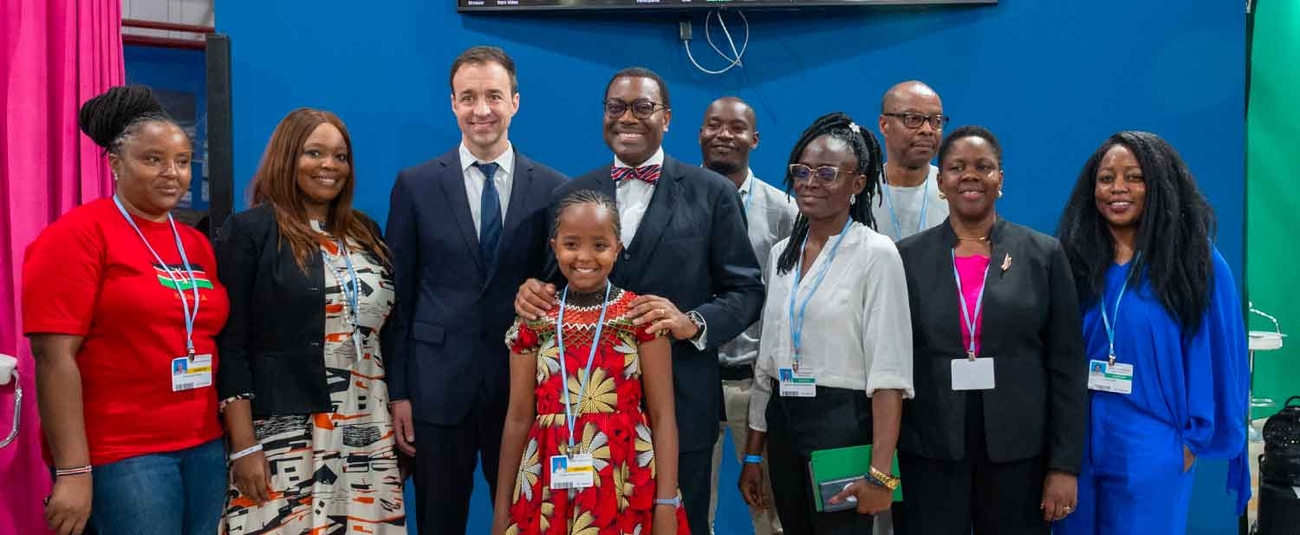
Twenty African youth-led enterprises have won grant funding of up to $100,000 each in this year’s African Youth Adaptation Solutions Challenge (YouthADAPT) competition. In addition to the grant, each winner benefits from a 12-month accelerator program to help them grow their businesses, deepen their impact and create decent jobs.
The annual competition and awards program for youth-led enterprises—which is 50% women-led—is jointly organized by the Global Center on Adaptation, the African Development Bank and Climate Investment Funds (CIF). The program is part of the Africa Adaptation Acceleration Program YouthADAPT flagship pillar(link is external).
The program boosts sustainable job creation by supporting entrepreneurship and youth-led innovations in climate change adaptation and resilience across Africa. The competition invites young entrepreneurs and micro, small, and medium-sized enterprises in Africa to submit innovative solutions and business ideas that can drive climate change adaptation and resilience.
Speaking at the awards ceremony, African Development Bank Group President Dr. Akinwumi Adesina, said: “Africa’s needs cannot be ignored. The youth must be at the center of everything we are doing about climate change. No young person is too young to engage in climate dialogue. Our young people must be part of the solution. They are creative, dynamic, and engaging. They are futuristic and must be part of the solution for climate adaptation in Africa.
“We want the youth to speak for Africa and develop solutions for the continent. For this initiative last year, we supported 10 youth-owned and youth-led businesses in Africa with $1 million. This year, we are supporting 20 businesses with $2 million. So, we can expect that next year, we will double efforts to $4 million dollars. That’s the way it’s going to go for Africa.”
Adesina observed that 80% of the winners’ businesses were in agriculture. He said: “Agriculture is the future of Africa. As you know, that has been my gospel for many decades. The lowest bar is for Africa to feed itself. The high bar is for Africa to feed the world. Agriculture is a business. I encourage our young people to do three things: Create, Adapt and Prosper. CAP for short.”
Norway’s Minister of International Development Anne Beathe Tvinnereim commended the enthusiasm that the competition generated among the youth. She said it is important to tailor climate solutions that could be scaled up for the various communities.
“That is where the youth of Africa come in – you see the problem; you see the solutions and you have the energy and the resources to deliver and we want to help you with that,” She said. She commended the African Development Bank and the Global Adaptation Center for creating the initiative.
Professor Patrick Verkooijen, CEO of the Global Center on Adaptation spoke about the impact of the award on one of last year’s winners, Juveline Ngum Ngwa from Bamenda in Cameroon who was able to scale up her business, Bleglee Waste Management. As a result of last year’s grant, she was able to open a second waste sorting factory and has developed further software for her drones which identify garbage which is blocking drainage systems.
He remarked: “Adaptation is good business. But it needs to be at scale. And that is exactly what the Africa Adaptation Acceleration Program – the AAAP – does. The AAAP is mobilizing $25 billion over five years to scale up and accelerate adaptation climate adaptation actions across Africa. And one of its four pillars is the YouthADAPT flagship program.”
The winning enterprises of the Youth Adaptation Solutions Challenge 2022 come from all parts of the continent. Half are female led. They are scaling innovations in critical social and economic sectors affected by climate change. These include agriculture, waste management, water resources and sanitation, renewable energy and energy efficiency.
The 2022 winners of the African Youth Adaptation Solutions Challenge are:
- Flushh, Namibia
- Green Impact Technologies, Malawi
- AgriTech Analytics, Kenya
- Baramoda, Egypt
- Cassavita, Cameroon
- Ecobarter, Nigeria
- Farmer Lifeline Technologies, Kenya
- Grocircular Agro Services, Nigeria
- IRIBA Water Group Ltd, Rwanda
- Mpatsa Engineering Company Limited (formerly Sustainable Water Irrigation and Farming Technologies), Malawi
- Viva Organica, Botswana
- Voltx for Engineering & Industries, Egypt
- West African Feeds, Ghana
- Kisumeo Organics Limited, Kenya
- Agroexpert farming, Senegal
- Eurl Algerienne Des Industries Technologiques, Algeria
- Lono, Côte d'Ivoire
- Pazelgreen Technologies, Nigeria
- Akatale On Cloud, Uganda
- Multi-Tech Sustainable Solutions (MTTS), Cameroon
Program organizers received 3,000 applications for this year’s competition. The top 50 were shortlisted to pitch their innovations before a jury.
About the Global Center on Adaptation (GCA)
The Global Center on Adaptation (GCA) is an international organization that works as a solutions broker to accelerate action and support for climate adaptation. It does this across a broad spectrum from local to international, in partnership with the public and private sectors. Founded in 2018, GCA operates from its headquarters in the largest floating office in the world, located in Rotterdam, the Netherlands. GCA has a worldwide network of regional offices in Abidjan, Côte d’Ivoire, Dhaka, Bangladesh and Beijing, China.
More information is available at www.gca.org
About the African Development Bank
The overarching objective of the African Development Bank Group is to spur sustainable economic development and social progress in its regional member countries, thus contributing to poverty reduction. The Bank Group achieves this objective by mobilizing and allocating resources for investment in regional member countries and providing policy advice and technical assistance to support development efforts. The African Development Bank allocates 67% of its climate financing funding to adaptation. The bank is looking to mobilize $25 billion that will go toward adaptation in addition to its effort to raise up to $13 billion for its African Development Fund, the bank’s concessional window for climate action during its latest replenishment phase.
Learn more: https://www.afdb.org/
About the Climate Investment Funds (CIF)
CIF is one of the world's largest and most ambitious multilateral climate finance mechanisms for developing countries seeking to shift to low carbon and climate resilient development and accelerate climate action. Its launch in 2008 emerged from recognition by world leaders that climate change and development are inextricably intertwined, and that climate-smart investment is needed at scale to deliver on the opportunities for green growth identified in the UN's Sustainable Development Goals (SDGs).
Learn more: https://www.climateinvestmentfunds.org/
UK steps up climate adaptation finance support for Africa
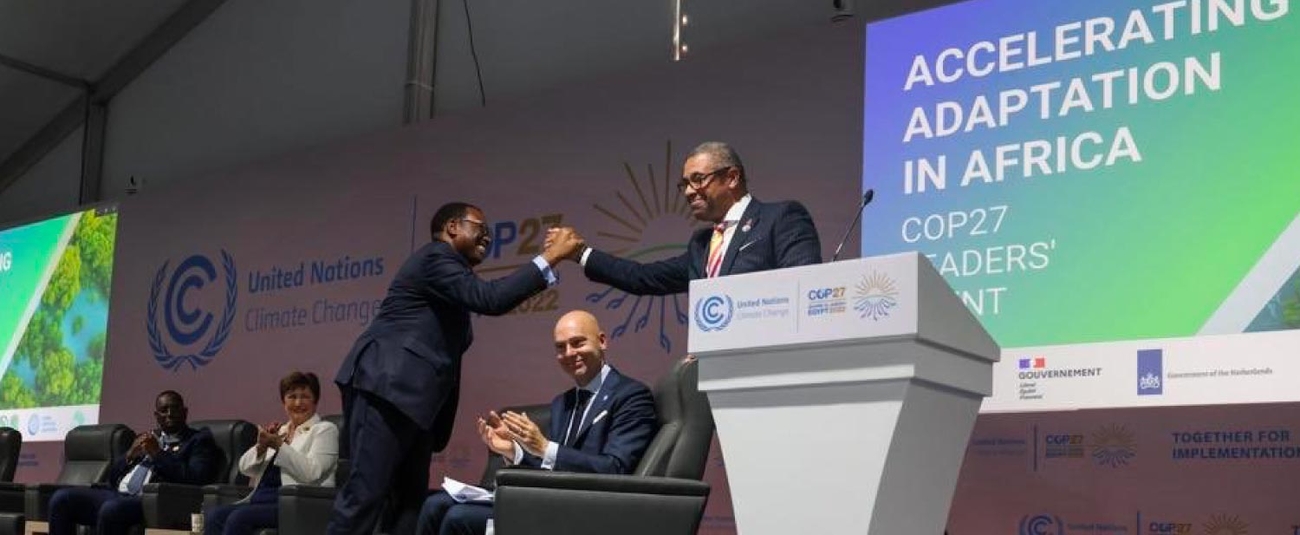
The United Kingdom has announced a significant increase in its financial support to the poorest African countries that bear the brunt of climate change.
Speaking alongside African leaders at COP27 in the Egyptian city of Sharm El Sheikh, British Foreign Secretary James Cleverly confirmed the UK will provide £200 million to the African Development Bank Group’s Climate Action Window, a new mechanism set up to channel climate finance to help vulnerable countries adapt to the impacts of climate change.
A number of countries on the continent have experienced extreme weather conditions from severe drought in Somalia to floods in South Sudan.
Foreign Secretary James Cleverly said: “Climate change is having a devastating impact on some of the poorest countries in Sub-Saharan Africa but historically they have received a tiny proportion of climate finance,” said Cleverly adding, “This new mechanism from the African Development Bank will see vital funds delivered to those most affected by the impacts of climate change, much more quickly.”
The UK Foreign Secretary noted, “Access to climate finance for emerging economies was a central focus at COP26 in Glasgow and I’m pleased to see tangible progress being made, supported today by £200 million of UK funding.”
Climate change has a disproportionate impact on the 37 poorest and least creditworthy countries in Africa. Nine out of ten most vulnerable countries to climate change are in Africa.
The Glasgow Climate Pact included a commitment from donors to double adaptation finance between 2019 and 2025.
Prime Minister Rishi Sunak announced at the weekend that the UK will surpass that target and triple adaptation funding from £500 million in 2019 to £1.5 billion by 2025. This funding package provided to the African Development Bank will be 100% preferenced for adaptation.
The Prime Minister also confirmed yesterday that the UK is delivering on the target of spending £11.6 bn on International Climate Finance (ICF) between 2021/22 and 2025/26.
The President of the African Development Bank Group, Akinwumi Adesina welcomed the additional funding from the United Kingdom and said,
“I applaud the UK government for this major contribution towards the capitalization of the Climate Action Window of the African Development Fund, as it seeks to raise more financing to support vulnerable low-income African countries that are most affected by climate change. This bold move and support of the UK will strengthen our collective efforts to build climate resilience for African countries. With increasing frequencies of droughts, floods and cyclones that are devastating economies, the UK support for climate adaptation is timely, needed, and inspiring in closing the climate adaptation financing gap for Africa.”
“I came to COP 27 in Egypt with challenges of climate adaptation for Africa topmost on my mind. The support of the UK has given hope. I encourage others to follow this leadership on climate adaptation shown by the UK”, said Adesina.
African and other global leaders meeting in Rotterdam say the continent is at a tipping point for climate adaptation action
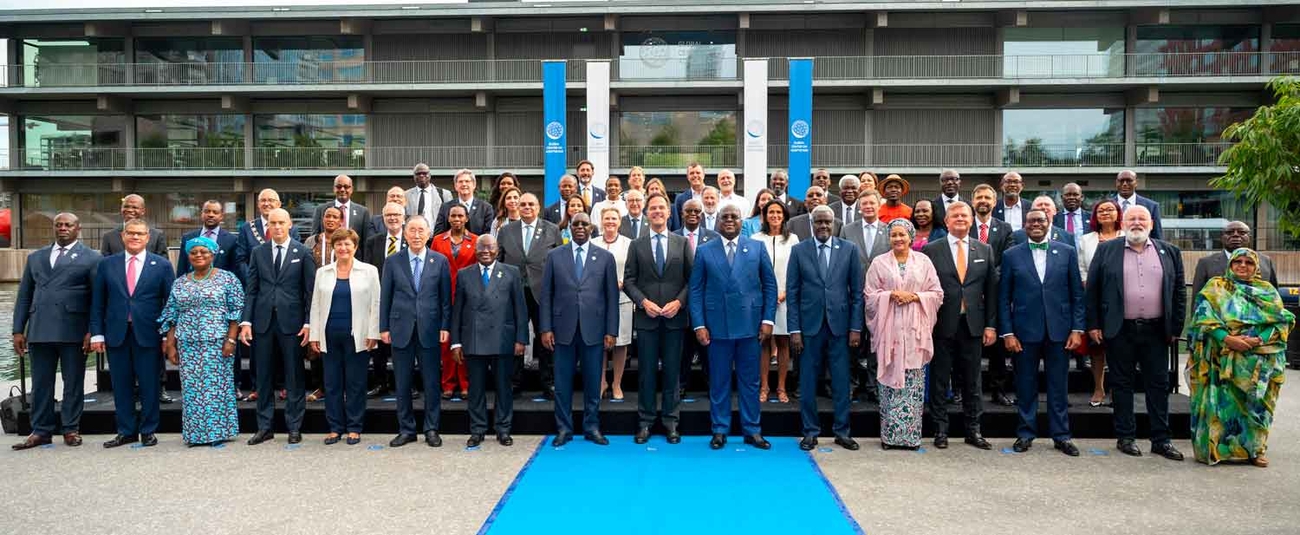
Two months to the 27th global climate summit (COP27) in Sharm El-Sheik, Egypt, African and other global leaders have rallied in Rotterdam, to highlight the urgency of climate adaptation funding for the continent.
The meetings—co-convened by the President of the African Development Bank Group Dr Akinwumi Adesina, CEO of the Global Center on Adaptation (GCA) Professor Patrick Verkooijen, and African Union Commission Chair Mousa Faki Mahamat—was unanimous about the need for concrete action and finance.
Former UN Secretary General Ban Ki-moon and GCA Co-Chair said: “The world has a fever. It burns hotter and higher with every day that passes… Statistics tell us that Africa is where the fever is at its most intense and people at the most vulnerable.”
GCA Co-Chair and Honorary Chairman of Royal DSM Feike Sijbesma spoke about the importance of support from the global private sector. He said 80% of the funding for adaptation needs to come from the private sector in both the developed north and the developing south.
GCA Chief Executive Officer Patrick Verkooijen emphasized the disastrous impacts of climate change hitting all parts of the world. He said it is in Africa, however, that climate shocks will hit the hardest. He said Africa was resolute about its economic advancement and would not stop. “Adaptation in Africa is like climbing a mountain. With all of you here today, we have the dream team that will climb the mountain together.”
Verkooijen added: “The next summit after today is Sharm El-Sheikh, the Africa COP. But success in Egypt will hinge on whether Africa’s needs are met or not. Africa has the commitment and the plan. That plan is the Africa Adaptation Acceleration Program (AAA-P). It is Africa-developed and Africa-owned. It was launched by Africa’s leaders, who are here today. It is the vehicle for delivering the Africa Adaptation Initiative.”
Established in 2020 by the GCA and the African Development Bank, the Africa Adaptation Acceleration Program lies at the center of climate action on the African continent. Participants acknowledged Verkooijen’s and Adesina’s joint efforts as the driving forces behind the program.
African Union Chairperson, President Macky Sall of Senegal, President Nana Akufo-Addo of Ghana, who is Chair of the Climate Vulnerable Forum, and President Felix Tshisekedi of the Democratic of the Congo conveyed a unified message: the international community must deliver on its pledge to double adaptation finance and to scale adaptation action for Africa.
President Sall expressed disappointment at the absence of industrialized country leaders at the summit. The African Union Chair said if African leaders could be in Rotterdam in person to discuss such a crucial issue as climate adaptation in Africa, the very least they expected was that their European counterparts—whose countries are among the world’s biggest polluters—would also have been present at the summit.
This sentiment was shared by Presidents Akufo-Addo and Tshisekedi, African Union Commission Chairperson Moussa Faki Mahamat and UN Deputy Secretary General Amina Mohammed, among others. Mohammed said: “A bird only flies with two wings, and the representation at this table is lopsided.”
The UN deputy chief added that it was not Africa’s fault that it is in its current position, given that it contributes very little to global carbon emissions. She pondered on what the situation would have been if the roles had been reversed. Mohammed said the COP26 Glasgow pact was at risk of failing if the developed world did not make good on its promises of delivering $100 billion a year for climate action in developing countries.
In his intervention(link is external), Adesina reminded participants that the African continent was warming faster than any other region of the world, as predictions from the Intergovernmental Panel on Climate Change show that the critical global warming levels will be reached much earlier in Africa.
The African Development Bank chief explained that in the face of the deluge, Africa does not have the resources to tackle climate change. He said the continent receives only 3% of global climate financing. He noted that if this trend continued, Africa’s climate financing gap could reach between $100 billion to $127 billion per year through 2030.
Adesina said: “The current climate financing architecture is not meeting the needs of Africa. New estimates by the African Economic Outlook of the African Development Bank show that Africa will need between 1.3 and 1.6 trillion dollars from 2020 to 2030, or $118 billion to $145 billion annually to implement its commitments to the Paris Agreement and its nationally determined contributions.”
The African Development Bank chief said the African Adaptation Acceleration Program’s upstream facility at the GCA had already helped to generate $3 billion of mainstreamed climate adaptation investments by the African Development Bank, from agriculture to energy, transport, water, and sanitation.
Adesina spoke of the African Development Bank’s African Development Fund (ADF), its concessionary lending arm as one of the ways to address the climate financing gap. He said the 16th replenishment of the fund, currently underway, presented a unique opportunity for full financing of the $12.5 billion in financing for the Africa Adaptation Acceleration Program.
The African Development Bank chief explained that the African Development Fund had introduced a Climate Action Window that would hopefully mobilize $4 billion to $13 billion for climate adaptation for the Fund’s member countries. “This will be used to support 20 million farmers with access to climate resilient agricultural technologies, access of 20 million farmers and pastoralists to weather-indexed crop insurance, reviving 1 million hectares of degraded land, and provision of renewable energy for about 9.5 million people.
Adesina said commitments by developed countries to provide $100 billion annually in climate finance for developing countries was long overdue. “Africa cannot wait,” he emphasized. “This is the time to support the Africa Adaptation Acceleration Program. This is the time to support the ADF 16th replenishment. This is the time to support the Climate Action Window of ADF-16.”
World Trade Organization Director General Ngozi Okonjo-Iweala also lent her voice to the clarion call for additional resources for Africa adaptation funding. Speaking about the role of trade in climate adaptation, she said trade policies should be integrated into global climate action as an amplifying force for financing and other climate-related support provided to vulnerable economies.
The summit’s five-point Communique(link is external) highlighted that Africa was at a tipping point. It emphasized that success at COP27 will depend on whether the needs of Africa, the world’s most climate-vulnerable continent, are met with finance flowing into such key country-led adaptation programs as the Africa Adaptation Acceleration Program.
GCA Co-Chair Feike Sijbesma said in closing: “Investments in global climate adaptation cooperation are a big opportunity for countries like the Netherlands to share some of our best innovations with those who need them the most. The AAAP will be a crucial vehicle for triggering far greater business investment across Africa into green and resilient solutions. This is a collective effort, we need every sector, every contribution possible to see off the climate crisis in Africa, and the private sector, in particular, has a massive role to play.”
COP27: Announcement of the Winners of 2022 YouthADAPT Awards
What: 2022 Youth Adaptation Solutions (YouthADAPT) Challenge Awards Ceremony
Who: African Development Bank and the Global Center on Adaptation
When: 10 November 2022, 10:30-12:30 GMT+2
Where: Africa Pavilion at COP27 (Sharm El-Sheikh, Egypt). Watch on Livestream
The Youth Adaptation Solutions (YouthADAPT) Challenge, launched on 6 September 2021, is an annual competition that invites young entrepreneurs and micro, small, and medium enterprises in Africa to submit solutions and business ideas that can drive climate change adaptation and resilience. The challenge is organized by the African Development Bank and the Global Center on Adaptation, as part of the joint Africa Adaptation Acceleration Program.
At 10:30 am GMT on 10 November, the competition will announce 20 winners during an awards ceremony at COP27 in Sharm El Sheikh, Egypt. The 20 winners will be eligible to receive business grants of up to $100,000 and the opportunity to participate in a 12-month business accelerator program to help them scale up their businesses and create decent jobs.
The event will include presentations by: Dr. Akinwumi A. Adesina, President of the African Development Bank; Prof. Patrick Verkooijen, CEO of the Global Center on Adaptation; and Mafalda Duarte, CEO of Climate Investment Funds.
The YouthADAPT Solutions Challenge aims to strengthen inclusive growth, and broaden investment and economic opportunities for youth and women in Africa. It is supported by funding from the African Development Bank’s Youth Entrepreneurship and Innovation Multidonor Trust Fund.
Awards Ceremony Program
THURSDAY, 10TH NOVEMBER 2022
10:30 – 10: 35: Welcome by Moderator
10:35 – 10:40: Overview of the Africa Adaptation Acceleration Program (AAAP) and the YouthADAPT initiative
10:40 – 10:50: Speech by Dr Akinwumi Adesina, President, African Development Bank
10:50 – 10:55: Speech by Prof. Dr. Patrick Verkooijen , CEO, Global Centre on Adaptation
10:55 – 11:00: Remarks by Ambassador Josefa Leonel Correia Sacko, Commissioner for Rural Economy and Agriculture of the African Union Commission (AUC)
11:00- 11:05: Remarks by Anne Beathe Tvinnereim, Minister of International Development, Norway
11:05 – 11:10: Overview of the YouthADAPT Challenge 2021
- Edith Ofwona Adera, AAAP Coordinator & Principal Climate Change Officer, African Development Bank
- Aramide Abe, Program Lead, Jobs for Youth & Entrepreneurship, Global Center on Adaptation
11:10 – 11:50: Unveiling the YouthADAPT 2022 Winners
11:50 – 11:55: Transition to closing session
11:55 – 12:20: Donor Roundtable and Open Dialogue with Youth entrepreneurs: How can we take the YouthADAPT challenge to scale?
12:20 – 12:25: Closing Reflections: African Union Special Envoy on Youth[1]
12:25- 12:30: Wrap-up by Moderator
COP26 Leaders’ Event – Africa Adaptation Acceleration Summit
What: COP26 Leaders’ Event – Africa Adaptation Acceleration Summit
Where: Meeting room 4, Zone F (in front of plenary rooms)/ also available on livestream here: https://bit.ly/31nTtIW
When: 14:15-15:45 on Tuesday 2nd November
Followed by press conference
When: 16:00-16:30
Where: Press Conference Room Durdle Door, Area D - Ground Floor
The future of Africa depends on global action and firm resource commitments to support climate adaptation. The recent IPCCC report highlighted the continent is the most vulnerable to climate change. The Africa Adaptation Acceleration Summit is the moment at COP26 for African heads of state and government to outline how they are ready to play their part to build resilience across the continent. They will outline the commitments made and the actions required by global partners for a sustainable future.
Confirmed speakers
Host’s Keynote address
Félix Tshisekedi, President of the Democratic Republic of Congo and Chair of the African Union
Keynotes
- António Guterres, Secretary-General of the United Nations
- Bill Gates, co-Chair of the Bill & Melinda Gates Foundation
- Akinwumi Adesina, President of the African Development Bank Group
- Antony Blinken, U.S. Secretary of State
- Kristalina Georgieva, Managing Director of the International Monetary Fund
- Ngozi Okonjo-Iweala, Director-General of the World Trade Organization
- Alok Sharma, President for COP26
Leaders’ interventions
- João Lourenço, President of Angola
- Mokgweetsi Masisi, President of Botswana
- Évariste Ndayishimiye, President of Burundi
- Jorge Carlos Fonseca, President of Cape Verde
- Faustin-Archange Touadéra, President of Central African Republic
- Azali Assoumani, President of Comoros
- Adama Barrow, President of Gambia
- Nana Akufo-Addo, President of Ghana
- Umaro Mokhtar Embaló, President of Guinea Bissau
- Uhuru Kenyatta, President of Kenya
- Andry Rajoelina, President of Madagascar
- Lazarus Chakwera, President of Malawi
- Filipe Nyusi, President of Mozambique
- Mohamed Bazoum, President of Niger
- Muhammadu Buhari, President of Nigeria
- Paul Kagame, President of Rwanda
- Wavel Ramkalawan, President of Seychelles
- Julius Maada Bio, President of Sierra Leone
- Samia Suluhu Hassan, President of Tanzania
- Faure Gnassingbé, President of Togo
Moderation
Patrick Verkooijen, CEO of Global Center on Adaptation
President Kenyatta endorsed as Global Champion for Africa Adaptation Acceleration Program
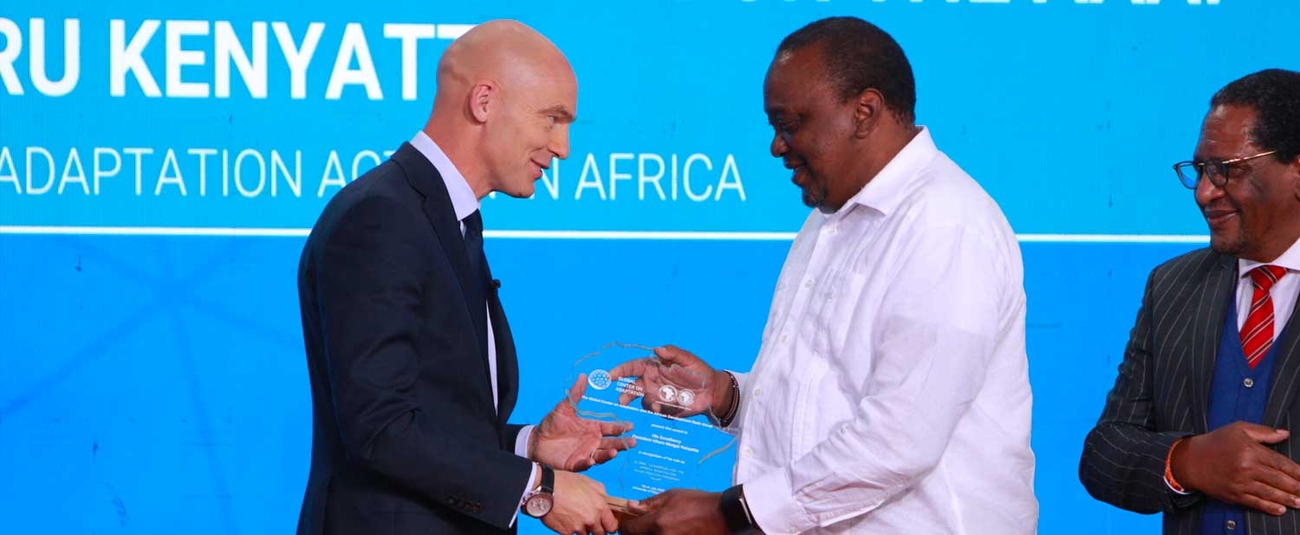
Global leaders on Thursday tasked Kenya’s President Uhuru Kenyatta to spearhead Africa’s effort to address climate change under the Africa Adaptation Acceleration Program (AAAP).
The Leaders Dialogue on Climate Adaptation, organized by the Global Center on Adaptation (GCA) on 7 July at the University of Nairobi, featured endorsements by the GCA Chair and 8th Secretary-General of the United Nations, Ban Ki-moon; African Development Bank Group President, Dr Akinwumi Adesina; World Trade Organization Director Ngozi Okonjo-Iweala; and IMF Managing Director Kristalina Georgieva.
President Kenyatta thanked former Secretary-General Ban Ki moon and GCA CEO Professor Patrick Verkooijen for giving him the role of AAAP Global Champion. He said: “Africa has been most adversely affected by climate change. Adaptation is not just important. It is a survival strategy.” Kenyatta recognized the joint efforts of the three multilateral institution heads “for their tireless efforts in championing the adaptation agenda.” He said: “I am confident that with support from friends like these, we shall reach our goal.”
Adesina said: “We need a champion, a tested leader with a respected global voice. President Kenyatta is a doer. He is a climate-friendly leader. His dynamism, voice and leadership will help as we drive for greater financing for climate adaptation for Africa.”
He explained that Africa loses 7 to 15 billion dollars every year because of climate change, and this figure was expected to rise to $50 billion per year by 2030. He said while nine out of the 10 most vulnerable countries to climate change (90%) were in Africa—accounting for just 4% of global carbon emissions—the continent received only 3% of total, global climate finance.
Adesina added: “Climate change is unfair to Africa and global finance on climate is unfair to Africa. The Bank is leading efforts to support Africa to adapt to climate change. We have doubled our climate finance to reach 25 billion dollars by 2025. We now devote 67% of our total climate finance to climate adaptation, the highest level among all multilateral financial institutions globally.”
Verkooijen said: “This is the battle of our lives, to contain climate change, to adapt to it, and by doing so, tame it. And in you, President Kenyatta, we have a champion lion tamer indeed.”
He highlighted some of President Kenyatta’s achievements and his strong record in standing up for Africa. “This record is globally unmatched,” said Verkooijen. “You pioneered Kenya’s commitment to land degradation neutrality. You ratified the Paris Agreement in record time. You made Kenya one of the first countries globally—not just in Africa but globally—to announce and submit ambitious NDC (Nationally Determined Contributions) targets, and there is much more.”
Verkooijen also recounted visits to Kenya’s Makueni County and Samburu County, where the community is investing in resilience with support from the African Development Bank. With the Bank’s support, he said, they are building water pans and boreholes that reduce the need to seek pasture far from home and which also create economic opportunities to grow crops, diversify incomes and build resilience for forests during the challenging times caused by failing rains.
Verkooijen encouraged the university students not to lean backwards but to lean forward and take advantage of this opportunity to engage in the adaptation agenda for Africa. “You are the future of the adaptation challenge. We look to you to develop innovative solutions for a resilient continent.” He told them he would return to announce the winners of the Disruptive Technologies Entrepreneurship Challenge in Kenya, where GCA and the University will award 50 million shillings ($485,000) each to scale up the most innovative solutions for climate-resilient infrastructure.
Vice Chancellor Stephen Kiama said a landmark partnership agreement between the GCA and the university would support a robust pipeline of investment for infrastructure in Kenya, enhancing climate finance, creating green adaptation jobs, and supporting Kenyan entrepreneurs in the scaling up of sustainable adaptation businesses.
Ban Ki-moon said President Kenyatta’s voice as a statesman had already carried the message across the world. He said: “Amid the bad news, the Africa Adaptation Acceleration Program is rapidly scaling up to deliver solutions on the ground. We are in a long, hard marathon. We have a true champion in you. Thanks to your commitment and determination, I know that Kenya will prove itself, through your government’s partnership with the GCA and the AAAP to be a climate adaptation example for others to follow."
IMF Managing Director Kristalina Georgieva said President Kenyatta’s international leadership on climate adaptation had inspired others to step up climate action. Georgieva said: “People everywhere face sharp cost of living increases, and food insecurity is dangerously rising in many regions. Many African countries must also contend with frequent, extreme weather events that bring human tragedy and socioeconomic disruption.”
She stressed the urgency for the green transition to include investments in resilience. She said Sub-Saharan African countries need to spend at least 2-3% of GDP per year on climate adaptation. “No country can do it alone, especially as many have elevated debts following the pandemic crisis.” She said it was critical for the international community to meet or exceed the goal of providing $100 billion in climate finance to developing countries each year, and importantly to make sure that a sizeable amount of the climate finance goes to adaptation in addition to mitigation.
WTO Director-General Ngozi Okonjo-Iweala commended Kenyatta for being a driving force behind the AAAP. She said his strong voice and leadership would inspire others to scale up and accelerate the actions required to adapt to climate change. She emphasized that trade was a necessary part of the solution to climate change adaptation and mitigation. “Just like the rest of our economic systems,” she said, “trade and the WTO can and must change to best support the just transition to a low global carbon economy and a climate resilient society”.
.embed-container { position: relative; padding-bottom: 56.25%; height: 0; overflow: hidden; max-width: 100%; } .embed-container iframe, .embed-container object, .embed-container embed { position: absolute; top: 0; left: 0; width: 100%; height: 100%; }
AfDB President’s remarks during the Leaders’ Dialogue on Adaptation Action in Africa
AAAP at COP27
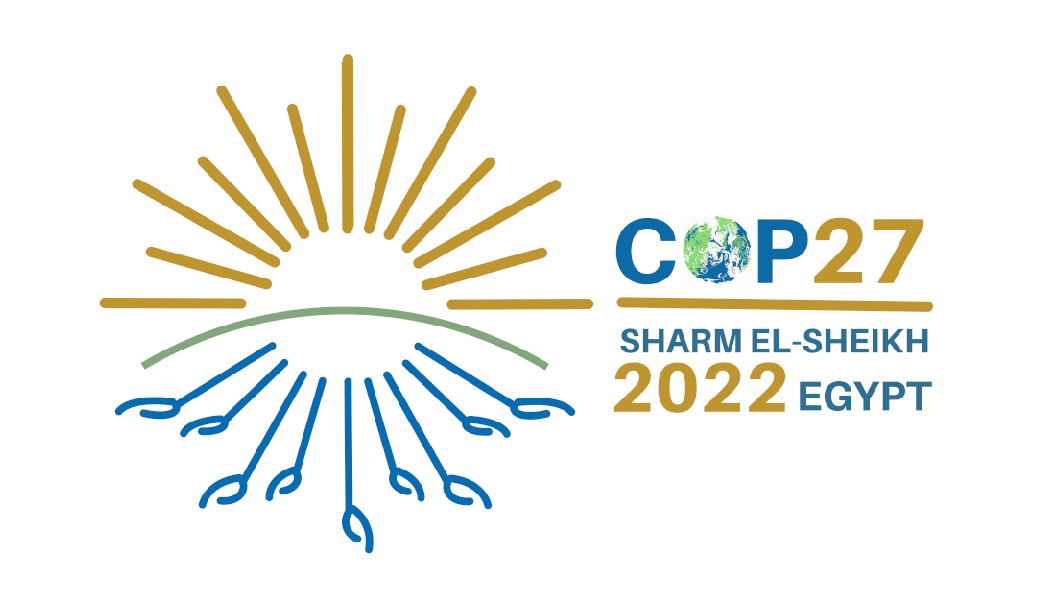
With the strapline, ‘Together for implementation,’ COP27 - the African COP, closed with a breakthrough agreement to provide “loss and damage” funding for vulnerable countries hit hard by climate disasters.
Here is a comprehensive look at AAAP’s focus on delivering an accelerated adaptation action in Sharm El-Sheikh.
Global Leaders Rally Support and Finance for the Africa Adaptation Acceleration Program to Tackle Climate Change in Africa
Global leaders rallied around climate adaptation for Africa. They attended the Africa Adaptation Leaders’ Event, convened by African Union Chair President Macky Sall of Senegal, Global Center on Adaptation CEO Patrick Verkooijen, and African Development Bank Group President Akinwumi Adesina.
The summit underscored the critical need for climate adaptation in Africa and responded to the call for the capitalization of the Africa Adaptation Acceleration Program (AAAP).
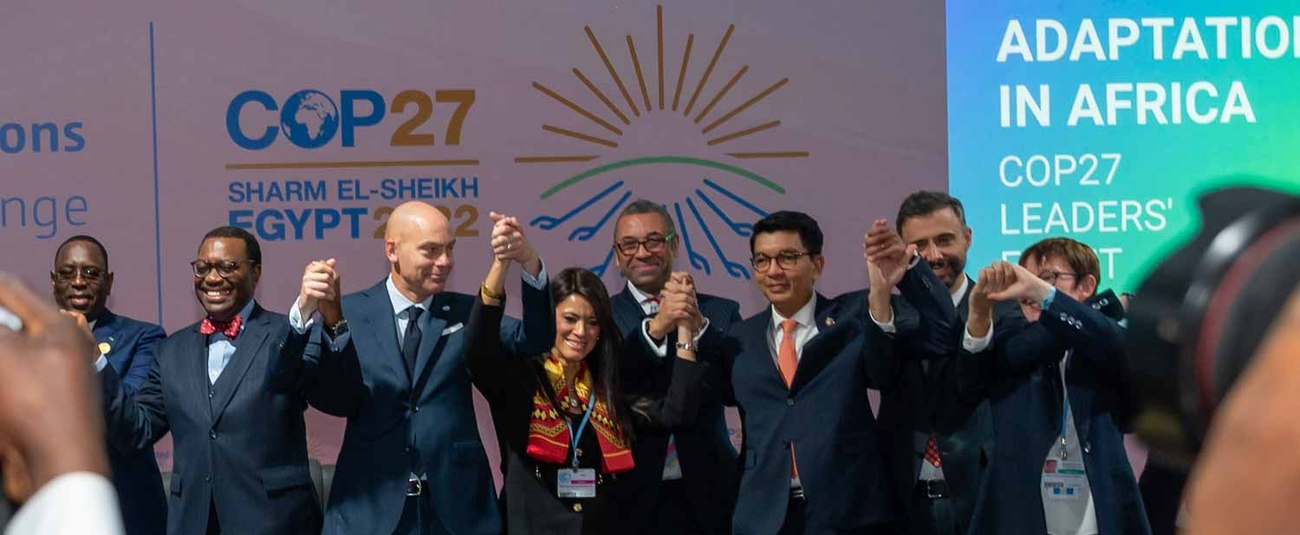
African Union welcomes the Netherlands’ contribution of EUR 110 million for the Africa Adaptation Acceleration Program at COP27
The African Union (AU) welcomed the Netherlands’ contribution of EUR 110 million in support of the Africa Adaptation Acceleration Program (AAAP) ahead of the COP27 Leaders’ Event on Accelerating Adaptation in Africa. The Prime Minister of the Netherlands Mark Rutte announced the financial commitment during a high-level meeting with Senegal’s President Macky Sallwho is also the Chairperson of the African Union, Patrick Verkooijen, CEO of the Global Center on Adaptation, and the President of the African Development Bank Group Dr Akinwumi A. Adesina.
Awards for Innovative Adaptation Solutions
On the sidelines of the 27th United Nations Climate Change Conference of Parties (COP27), which closed on 18 November 2022 in Egypt, the African Adaptation Acceleration Program unveiled the winners of the 2022 YouthADAPT challenge. For this second edition, 20 projects with USD 100,000 each for their climate innovations, particularly in the fields of agriculture, energy, and waste.
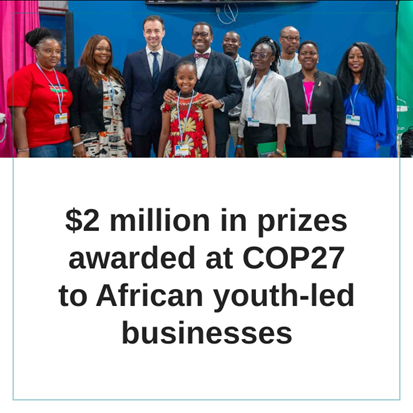
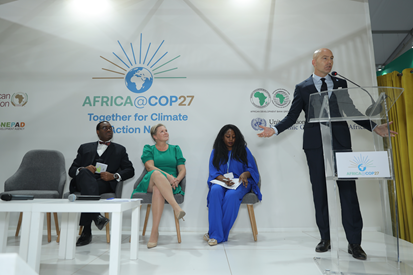
Showcasing Innovative Adaptation Solutions (2021 YouthADAPT Winners)
The winners of the 2021 YouthADAPT awards showcased their adaptation innovations at the Youth Pavilion. Three of the 15 winners demonstrated how additional funds from the YouthADAPT program had supported the growth of their businesses scaled-up business solutions and positioned these enterprises to better access further financing to support their growth.
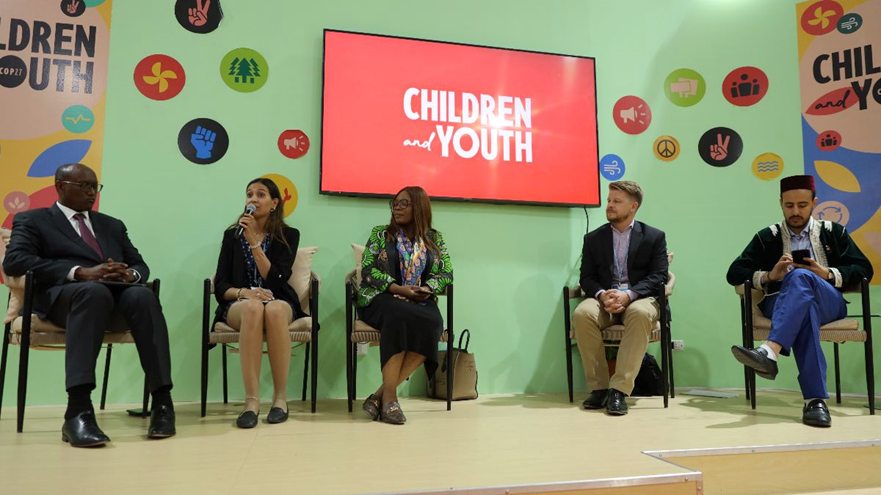
Climate-proof Infrastructure solutions for low-carbon and resilient development in Africa
At the AAAP COP27 event on climate-resilient infrastructure, the Swiss Confederation through the Swiss State Secretariat for Economic Affairs (SECO) and Spain announced additional financial support to the African Development Bank Group’s Urban and Municipal Development Fund (UMDF), a thematic trust fund that helps African vulnerable countries to spur equitable green and climate resilient urbanization.
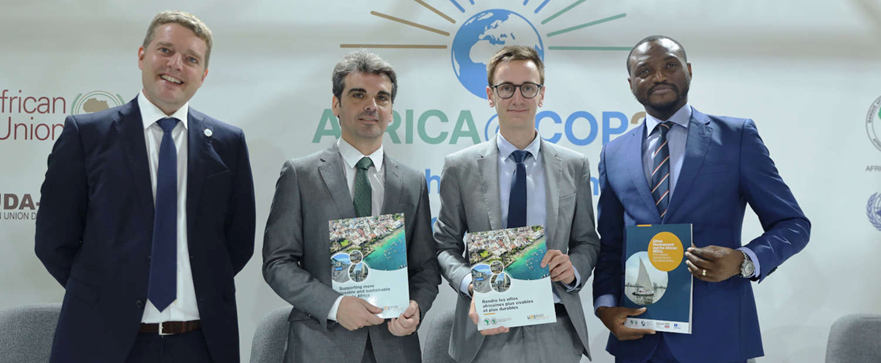
Le Programme sur l'accélération de l'adaptation en Afrique (AAAP). Opportunités pour l'Afrique francophone.
Passer en revue les exemples et les résultats des activités opérationnelles de la Facilité de financement en amont du PAAA, Mettre en évidence la façon dont le Programme d'accélération de l'adaptation en Afrique produit un triple dividende, en évitant les pertes futures, en stimulant les gains économiques et en offrant des avantages environnementaux et sociaux grâce aux investissements dans l'adaptation.
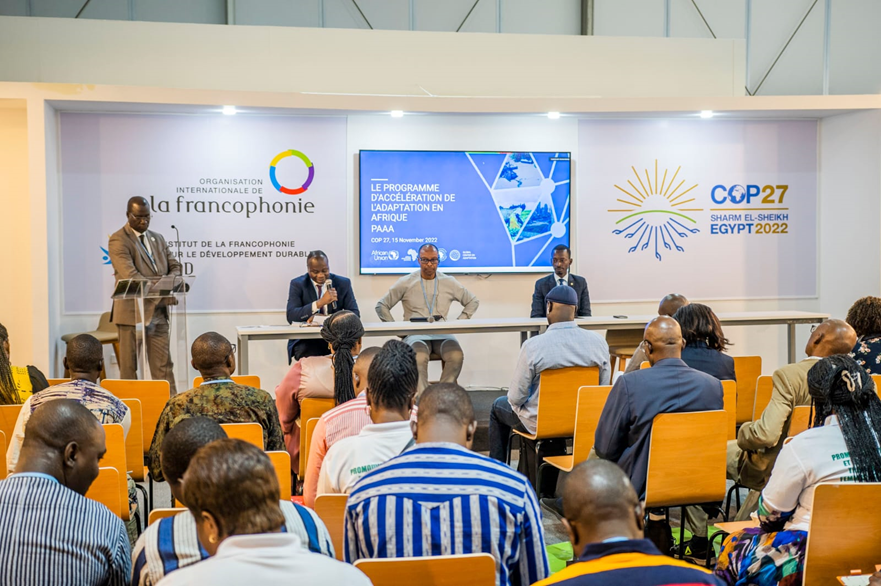
Mobilizing innovative Financing for building resilient and sustainable food system for Africa
African agriculture ministers attending the United Nations climate summit in Egypt reiterated a commitment to work with development partners to unlock the continent’s agriculture potential. During the special ministerial session, there was a strong consensus that Africa can feed itself if supported with green financing and climate-smart technology to boost agriculture productivity.
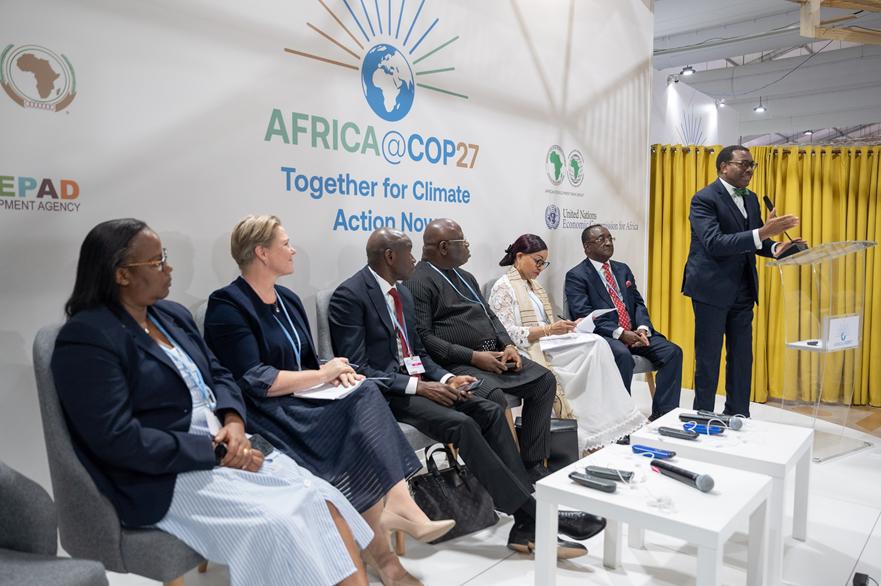
Bridging the adaptation finance gap - Innovative financing mechanism to attract the private sector
In the face of the climate crisis, Africa does not have the resources to tackle climate change. The continent receives only 3% of global climate financing. If this trend continues, Africa’s climate financing gap will reach $100 billion to $127 billion per year through 2030. How do we bridge the adaptation gap? AAAP organized a side event at the MDB Pavilion to discuss innovative instruments, tools, and approaches for climate finance.
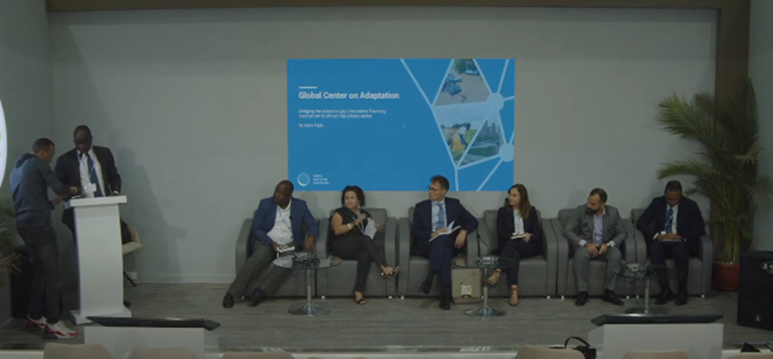
More AAAP COP27 related news
Session on Water Solutions for Climate Adaptation: lessons to scale up impactful delivery during the 2023 UN Water Conference
What: Session on Water Solutions for Climate Adaptation: lessons to scale up impactful delivery during the 2023 UN Water Conference
Who: Africa Adaptation Acceleration Program of the African Development Bank and the Global Center on Adaptation
When: 22 March 2023, 18:30 EST
Where: United Nations Headquarters, Conference Room 9
Event description:
The Global Center on Adaptation and the African Development Bank are co-convening a high-level event at the UN 2023 Water Conference. This is the first event of its kind in nearly five decades. It places water at the center of a robust global response to climate change.
The session will dwell on the need to build resilience to climate change across Africa, developing states and vulnerable nations. It will propose proven water solutions for a warming world to advance climate adaptation and a model of delivery to achieve impact at scale. Furthermore, it will share lessons from the model of implementation in the Africa Adaptation Acceleration Program.
It will also serve as a launch pad to highlight the Africa Adaptation Acceleration Program’s achievements within its Water-Urban sub-program and seek its replication as a model in other regions, particularly Asia and small island states.
The high-level dialogue will feature statements and contributions from invited leaders across the fields of global politics and international finance.
Scaling Up Youth-led Adaptation Technology Solutions - 3rd Gobeshona Global Conference
What: Session on Scaling Up Youth-led Adaptation Technology Solutions during the 3rd Gobeshona Global Conference
Who: Africa Adaptation Acceleration Program of the African Development Bank and the Global Center on Adaptation
When: 15 March 2023 |10:00 – 11:30 GMT
Where: Virtual (Click here to join the session)
The Africa Adaptation Acceleration Program (AAAP) will host a discussion on scaling up youth-led approaches to adaptation on the sidelines of the 3rd Annual Gobeshona Global Conference on research into action. Gobeshona, organized by the International Centre for Climate Change and Development, will take place from 10-16 March 2023.
The African Adaptation Acceleration Program is a joint initiative of the African Development Bank and the and Global Center on Adaptation.
The session will draw on the AAAP’s YouthADAPT pillar, which aims to unlock the untapped potential of Africa’s youth to drive resilience and green enterprise. It will showcase youth-led innovations and innovative technologies, and discuss best practices in scaling up innovative technologies. It will also explore the key role that youth can play in driving climate technology innovation and adaptation.
Young people are at the frontier of climate risk as today’s climate action will directly affect the rest of their lives. With an urgent drive to act to avoid disastrous climate change, an increasing number of youths are leading climate adaptation efforts in their communities and regions with innovative adaptation solutions that are bringing real and concrete change.
Media Contact: Joash Ntenga Moitui, email: j.moitui@afdb.org, Communications and Knowledge Management, Africa Adaptation Acceleration Program (AAAP)
Unlock the impact potential of agricultural SMEs in Africa, experts urge at Dakar 2 Food summit
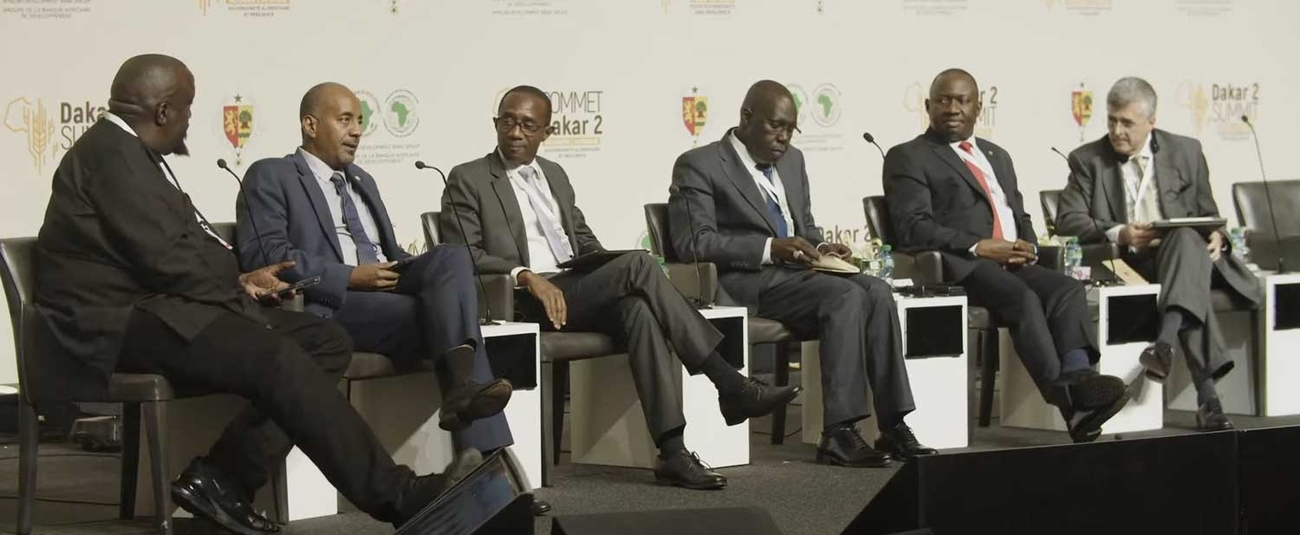
Global experts meeting during a panel session at the second international summit on food production in Dakar called for accelerated avenues to close the financial gap in agriculture and address barriers to the growing finance market for agricultural Small and Medium Enterprises (SMEs).
The discussions come in the wake of supply chain disruptions as a result of COVID-19 pandemic, the war in Ukraine, rising inflation, high commodity prices that have led to increased food and nutrition insecurity.
The session, titled, Closing the Financing Gap was moderated by Alan Kasujja, Presenter, BBC World Service.
At the summit, the African Development Bank Group and the Government of Canada announced the establishment of a new special fund to support Africa’s small and medium-sized enterprises (SMEs) in the agriculture sector.
The Agri-food SME Catalytic Financing Mechanism aims to catalyze and de-risk investment for agriculture SMEs. It will also strengthen agricultural value chains and improve food security across the continent.
The experts urgedlenders to explore blended finance to help de-risk agricultural transactions, reduce transaction costs and attract private financing by improving the risk-return ratios.
“A key challenge of the sector is the understanding of the risks…We need blended finance for things that are riskier to be done,” said Wagner Albuquerque de Almeida, Global Director for Manufacturing, Agribusiness and Services at the International Finance Corporation (IFC).
Trade and Development Bank head Admassu Tadesse said financing agriculture is not as risky as is often perceived. “It depends on which part of the cycle. We focus on the tail end, where is there is low risk,” he said.
Agri-SMEs’ biggest sources of financing are local commercial banks. However, banks prefer to invest in larger, more mature enterprises such as established aggregators and local processors who command regional or national market, Tadesse noted.
Danladi Verheijen, Co-founder and CEO of Verod Capital, a private equity investment firm, stressed that agriculture should be seen as an investment opportunity.
“Investors want to get in where there are high returns,” he said. He noted that one of the challenges in agriculture is finding the scale of businesses attractive enough for financial intermediaries to engage with them.
Panelists also noted that food value chains in Africa are currently not set up to maximise the potential of our food system. This growing realization has jolted players in Africa’s agricultural sector to seek practical solutions to restore the continent’s food security.
There is vast potential for establishing production and trade links, as well as synergies between different actors along the entire agribusiness value chain : producers, processors and exporters.
“All the elements need to come together. You need to have an ‘airbag’ if things go wrong,” said Dr. Heike Harmgart, Managing Director for the Southern & Eastern Mediterranean, European Bank for Reconstruction and Development.
Speakers also urged farmers and agri-SMEs to “reclaim their power” through cooperatives. “We need to help them to be organised to create clusters, and cooperatives and to create a sense of professionalization into the sector”, said Albuquerque de Almeida
Agreeing with Almeida, Dr. Olagunju Ashimolowo, the Vice President, Operations for ECOWAS Bank for Investment and Development urged governments to identify cooperatives to manage farmers. He also asked livestock owners to properly channel the funds in a way that would be “attractive and bankable.”
The African Development Bank’s Africa Adaptation Acceleration Program (AAAP) digital agriculture annex is deploying digital technologies targeted at smallholders, agri-SMEs and value chain actors to build actors to use digital technologies in agricultural practices.
COP27: experts explore avenues to mobilize more robust financing for climate Action
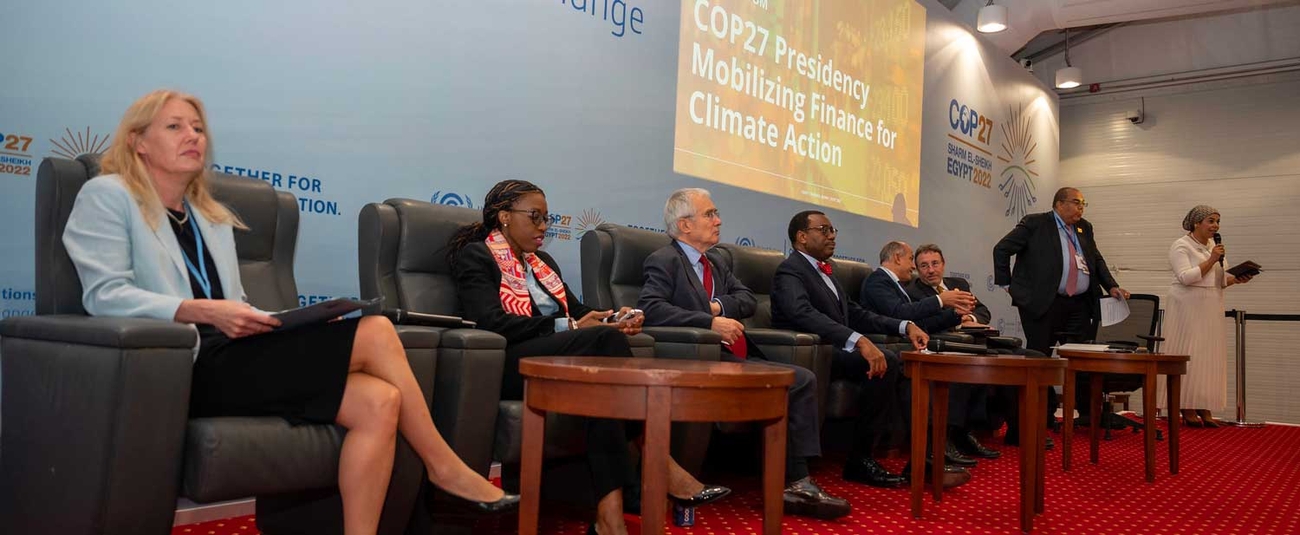
Global experts meeting during a panel session at the 27th global climate summit (COP27) in Egypt have endorsed a new climate finance roadmap to mobilize $1 trillion in annual external finance required by emerging markets and developing countries—excluding China.
The roadmap draws on the findings of a recently released report, Finance for climate action: Scaling up investment for climate and development(link is external), produced by a panel of experts chaired by Vera Songwe and Lord Nicholas Stern.
The discussions during the panel session underscored the need to boost effectiveness of policies by tailoring them to countries’ needs. The report advocates a rapid and sustained investment push to drive a strong and sustainable economic recovery from overlapping crises and to deliver on shared development and climate targets.
Songwe said investment priorities must encompass transformation of the energy system, address developing countries’ growing vulnerability to climate change and undo earlier harm to natural capital and biodiversity.
“The scale of investments needed in emerging markets and developing countries over the next five years and beyond will require a debt and financing strategy that tackles festering debt difficulties, especially those of poor and vulnerable countries,” Songwe said. She added that reforms must lead to a major expansion of domestic and international finance –public and private, concessional and non-concessional.
African Development Bank President Dr. Akinwumi Adesina decried the inadequate flow of climate finance to Africa. “The whole conversation about rich nations paying Africa $100 billion cannot even compensate Africa,” he said.
Adesina said African Development Bank initiatives like the African Adaptation Acceleration Program (AAAP)—a scheme developed by the bank and the Global Center on Adaptation in 2021—was mobilizing $25 billion to scale adaptation action across the continent. He said AAAP had so far drawn contributions from industrialized countries. He added that the African Development Fund, the African Development Bank Group’s concessional lending arm to low-income countries, was launching a climate action window to mobilize up to $13 billion for climate adaptation for vulnerable countries.
Adesina reiterated the call for International Monetary Fund Special Drawing Rights (SDRs) to be channeled to African countries through the African Development Bank. “SDRs will play a big role in helping Africa’s climate action, and the African Development Bank is well-positioned to leverage this reallocation four times to help mobilize financing for countries that need it most,” he said.
Stephanie Pfeifer, Chief Executive of Institutional Investors Group on Climate Change(link is external)—an association representing investors—said strong policies were vital in carbon pricing to phase out fossil fuels.
“The world needs development finance at scale for different types of risks, and data must also be made available to stimulate increased private sector investment into climate finance,” Pfeifer said.” If we get the whole system working together, we can make a lot of progress,” she added.
United Nations Climate Change Champion Mahmoud Mohyedin moderated the session, titled Facilitating finance necessary for delivery of commitments.
